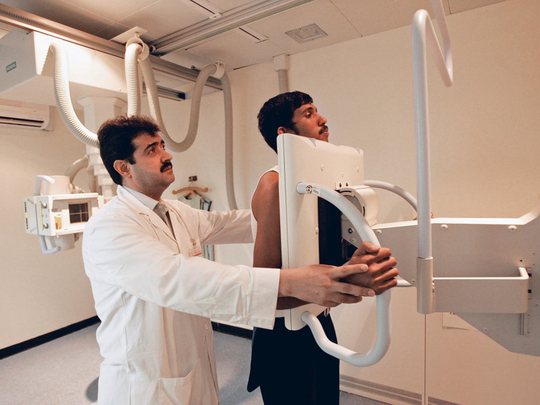
Dubai: Over 95 per cent accuracy was achieved in detecting cases of infectious chest diseases in 2017 in Dubai with the help of the Salem Artificial Intelligence (AI) system, Dubai Health Authority (DHA) said on Tuesday.
The Salem AI system, launched by the DHA in collaboration with Agfa Health Care, introduced the chest X-ray reading algorithm to detect infectious diseases like TB among expatriates applying for new or renewal of residence visa. In the pilot Phase I, the algorithm was used in the Muhaisnah Medical Centre which achieved 90 per cent accuracy in screening. In Phase II, it analysed random images from across all 20 medical fitness centres of the DHA and achieved 95 per cent accuracy and was able to achieve this success in lesser time, saving precious waiting time for customers and medical staff alike.
The DHA did not say how many people were found with active or old TB cases during this period.
Speaking at the Dubai International Government Achievements Exhibition, Dr Maisa Abdul Karim Al Bustani, director of medical fitness at DHA, said the Salem AI algorithm would soon be in the roll-out phase across all centres. Currently, the algorithm is focused on infectious chest diseases owing to the government law in disallowing those with infectious chest diseases during the mandatory medical screening for residence visa.
“Over two million visitors come into Dubai and the medical fitness centres handle one million chest X-rays. Our doctors are handling over 5,000 chest X-rays every day. This unique algorithm flags the ‘problem’ X-rays allowing for the healthy ones to be segregated from those that are marked, saving an incredible amount of time and labour.”
Dr Al Bustani added that once the Salem AI was rolled out by next year, DHA would be gradually moving towards centres with zero human interference in screening.
Dr Mohammad Abdul Qader Al Reda, director at the executive office for organisational transformation at DHA, said that eventually there would be other algorithms created for flagging retinopathy damage in the eyes of diabetics, analysing pixel data, as well as heart and brain strokes that will give advance warning.
David Hatton, regional IT director at Agfa Health Care, added that their organisation has been working with DHA since 2015 and it has taken X-ray screening of millions of people to develop the specific algorithm.
“We will be creating multiple algorithms for screening of different health conditions eventually,” Dr Al Reda said.












